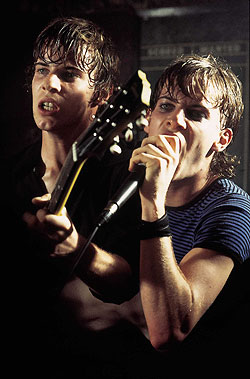Nostalgia for the ’70s has been tiresome since, well, the ’80s. So the prospect, at the Seattle International Film Festival this spring, of an adaptation of a 1977 novella about a fictitious British punk band that never was didn’t inspire much confidence. If fashion and TV ads aren’t busy enough selling us back this generation’s cultural detritus, what more might the movies have to offer? Tragedy, for one thing, which ought to push from your mind the notion of Brothers being a mockumentary about conjoined twins who rebel against a music impresario’s efforts to fashion them into a late-glam-era pop act. It’s all fakery, but there’s no mockery in sight. And the craftsmanship of documentary filmmakers Louis Pepe and Keith Fulton (Lost in La Mancha), here making their feature debut, is as serious as the period style they reference from the Maysles brothers and D.A. Pennebaker. The theme is nothing less than “the loss of innocence, or the exploitation of innocence.”
This said by Ken Russell, playing himself, as Brothers flashes back to his screen treatment of the twin musicians, Two-Way Romeo (a fake movie within a fake movie), meant to be just as naughty as the song that inspired it. Brothers presents itself at first as a talking-heads doc, with old stills and home movies, the Russell excerpts, even an appearance by author Brian Aldiss (actually an actor). The film takes its time putting you in the mood of a pre-Thatcher, post-Beatles England. It introduces a filmmaker (Tom Bower) whose up-close camera purportedly documented the brief rise and fall of the Bang Bang, that footage then stitched together with recollections about the twins, some 30 years later, Behind the Music–style.
The lads in question are—on the left, playing guitar—Tom (played by Harry Treadaway) and singer Barry Howe (Luke Treadaway), raised in rural isolation by their father and sister in the salty Norfolk marshes of L’Estrange Head. They’re twins, conjoined by an isthmus of flesh between their torsos, but hardly identical. Barry’s the brash, dominant sibling who talks back to the band’s manager. Tom’s the more dutiful follower, surprising everyone when he begins writing songs at the rural estate where the Bang Bang have been sequestered to record their first album.
These scenes, and the music produced there, are a marvel of resurrected ’70s style, and Brothers‘ artfully rusticated film stock really looks like it’s been dusted off from the vaults of that era. The airwaves are open to the Bang Bang; Britpop is ready for the next great thing. When the band plays its their first London pub date, the crowd is first freaked out, then exhilarated by the Howe brothers’ bizarre physicality. One fan gushes, “It doesn’t matter what you look like; it doesn’t matter what you wear.” Ergo punk.
Having devised this secret history of ’70s rock, Brothers doesn’t have much further to go—and wisely, it doesn’t. The Bang Bang can’t reach the charts, or it wouldn’t be a secret. Between the Howe brothers inevitably comes a woman (first Tania Emery, later Diana Kent); and with their success come the booze, drugs, and ominous hints of a creative split that would be literally fatal to them both. In their downfall, directors Pepe and Fulton (see interview at right) have created a forgery that feels authentic, true to its times, mournful for their passing. BRIAN MILLER








